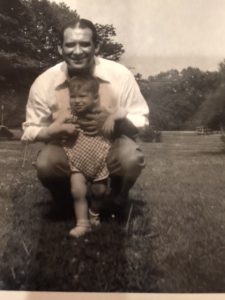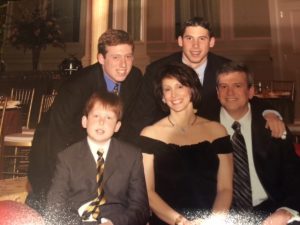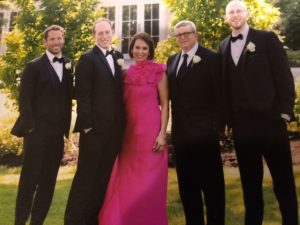Jan 09, 2018 | Barry Chasen
To me, the underdog is characterized by a lifelong fight. Things seem bleak, but the underdog fights to overcome. He fights and he struggles. He keeps his head down and works. Every once in a while, pop culture reminds us of how great the underdog story is: a JFK is elected or an Obama inspires us all. The Orioles beat the Yankees. But then, almost always on cue, the underdog is forced to endure more struggle. The underdog sees his fight stopped and his dream deterred.
However, what makes the underdog special is how he responds to struggle. The underdog responds to insurmountable odds by gritting his teeth and pushing forward. The underdog does not stop trying. I am intimately familiar with the underdog’s story, and it’s why I do what I do. Why? Because I am one.
I started ChasenBoscolo on March 5, 1986, to be a law firm for the underdog, by the underdog. Back then, it was just Law Offices of Barry M. Chasen, and it was just my secretary and me. My oldest son had just been born. He was two months old when I started the firm. My friends told me the timing seemed a little off, but when you’re driven by a passion and you’ve got the underdog’s fight, timing doesn’t matter.
Five years before going out on my own, when I got my first job as a lawyer, it was the first time that I had ever set foot in a law firm. I was 33 years old. I was the 19th lawyer in a firm that represented injured workers in workers’ compensation claims and plaintiffs in personal injury cases in Maryland, DC and Virginia. However, over the five years that I worked for another firm, I learned a sad truth: lawyers in the industry made decisions and gave counsel to their clients that were in the firm’s best interest rather than the client’s. The goal was to increase the fee that the firm made. That felt wrong to me. Frankly, that is wrong.
So I left and started my own firm, the firm that today is called ChasenBoscolo. I did it, no matter how odd the timing, because I was sure that I could represent my clients and do a better job than the old firm. Of the cases that I wanted to take with me, 91% of the clients elected to stay with me. They wanted me to fight for them. I was committed to working in their best interest. I was committed to a philosophy then that still guides our firm today: if you take care of the clients, the money will take care of itself.
But all of this started long before I started fighting independently for my clients. Much earlier than my career as a lawyer, I had to fight for myself. Because we don’t have all day, and because in the interest of your time, I’ve edited my first draft of this post down from nearly 5,000 words. I’ll simply share three short segments of my own “underdogging” so that you can see why the fight we take on at ChasenBoscolo really hits home for me.
1.
I’m ten years old. I’m poor—well, my family is poor. My father, a taxi driver with an eighth-grade education, is working through the night. Last week he was robbed at gunpoint, so we don’t have any money. This week, we’ll be lucky if he brings home a hundred dollars. Me and a classmate both rip our jeans sliding into base at recess. He returns to school the next day with a new pair. I return with a patch on my ass. I realize I’m poor when my friends go to summer camp, to swimming pools and to amusement parks. I don’t do any of that. I’m lucky if my father drives us to the ocean for a day trip in his cab. Despite our poverty, my parents constantly reinforce that even though we have no money, I will get a college education. They ensure me that we will figure it out. At ten, that doesn’t mean much to me, but I feel supported.

As I get older, it means the world. I’m confident in myself because of their support. Then my father dies from a fatal heart attack on the street. He’s 51 years old. Things get worse. My mother cannot not maintain the mortgage payments on our house. It’s sold at auction and then rented back to us. Our phone service is shut off; our lights don’t turn on. I don’t know where our next meal is coming from.
I’m an underdog though. I’m a fighter. I don’t give up. Although I want to go to college, I work instead. I’m hired by the Social Security Administration as a GS-2 file clerk making $3,680 a year. I get promoted multiple times over a few years. I end up being promoted to the level of a computer programmer. I even start taking college courses at night and finish enough credits to be about a quarter of the way done. The light inside me will not flicker out.
2.
I’m drafted into the army. The 1960s are a time of unrest. College students, African-Americans and others protest against the actions of our government. We are engaged in an unpopular war and the rights of African-Americans are being infringed from equal accommodations to voting rights to economic equality. The anti-war protests become increasingly violent with flag burnings, bombings, rock throwing. Groups like the Weather Underground, Students for a Democratic Society, The Black Panthers, The Symbionese Liberation Army and The Youth International Party are all active in the ‘60s. In the Civil Rights Movement, there is a mix of violent and non-violent protests. They are fighting for justice, equality and opposing a war that is remote to the interests of the United States and is taking place half a world away.

I am anti-war. I don’t consider moving to Canada, but I don’t understand what we’re doing in Vietnam. I keep my head down and I push myself during our basic training. I have no other choice but to fight, to do my best. I’m offered an opportunity to train to become an officer, and I take it. I understand that I may be safer as an officer than as an artillery man. Things are looking up. But of course, as always, the underdog is faced with challenges no matter how good things seem to get.
I train to be an officer, and this is how it goes: after a hard day of training, our commanders show up at our barracks and tell us to put on our full-pack uniforms. They then take us for a long run which culminates with us crawling through a muddy stream. We’re exhausted and filthy when we get back to our barracks after 11:00 p.m. The training commanders then tell us that we have an inspection at 5:00 a.m. After we’re dismissed and go inside, we discover that our bunks have been trashed and our bookcases overturned. Our foot lockers and lockers have been turned upside down. We have six hours to get everything in order, and then we’ll do it all again the next day. That seems bad to me until I get to Vietnam.
I land in Vietnam and spend a few months doing basic intelligence reporting, but then everything changes. I’m walking back to my office with my commanding officer after a meeting and suddenly a succession of rocket blasts come closer and closer. The blasts do not stop. We start to run. My ears are ringing now but it’s my heartbeat that I hear. Me and my commanding officer slide into a bunker, a hollowed-out mound of wet sand bags. We look at each other but neither of us say a thing. Our faces say enough: fear. I hear my heart beat. I hear the blasts, still louder. And then finally, just before I’m sure the next one will land on our bunker, they stop. I sit there for a long time and consider how lucky I am. Then I think about how unlucky I am. Then again—lucky.
Sometimes, for some people, the blasts don’t stop before the bunker. For me they do, and I get to come home after another year. Within 30 minutes of landing at Travis Air Force Base in the Bay area, I am called a “baby killer” by protesters outside the gates. I cannot wear my uniform off base without being subjected to a constant barrage of verbal abuse. Whenever I appear in public in uniform, I am always insulted and attacked.
3.
It’s 2018 and I’ve survived Vietnam. I’ve finished night school at the University of Maryland University College. I’ve finished law school at night too: the University of Baltimore. I’m a lawyer. I’ve found my calling, and I’ve made a career out of it. I’ve realized that my old employers had the wrong attitude. They didn’t know what it meant to be an underdog. When I leave that firm, I take almost all of my clients with me. Since then, I’ve helped thousands of other clients. I’ve won countless cases. I’m proud of myself. I’ve grown my firm.
I’ve married the love of my life, and I have three wonderful sons who are grown themselves. They didn’t have to go to night school. I’ve provided for them in a way that they’re not the same underdog I was. But they still are underdogs in some sense. We all are in different ways.
It’s 2018, and the firm is still growing. We’re successful; we have commercials. We’re hiring lawyers and winning cases. We’re delivering justice to underdogs. I’m checking every box by the measure of conventional success. But things are not easy. We haven’t cracked a code where winning cases is easy. Let me explain why: being an underdog means that you’re fighting a beast that’s bigger than you.
It’s 2018, and judges have been “tort reformed.” They default to side on the behalf of the insurance companies—the behemoth conglomerates making more than a billion dollars a year. Case decision makers—commissioners—suffer from “compassion fatigue.” The law is not applied fairly and impartially and the law is rarely construed in favor of the injured worker. Some of this is the result of politics. Some of it has occurred because of tort reform propaganda and lies.
It’s 2018, and the deck is still stacked against the underdog. On one side, you have the little guy represented by a firm not much larger than a football team. On the other side, you have big corporations or insurance companies with virtually unlimited resources. They will always present the best evidence that money can buy. These companies on the other side make more than $250 million per quarter. In three months, they make more money to use at their disposal than we can ever dream of.

It’s 2018, and I continue to fight. I continue to fight because it’s what I know how to do. I know how to push on, hungry and in the dark: my father has died. I know how to push on, heartbeat in my throat: the blasts get closer and closer and my commanding officer and I believe that we’re already dead. And I know how to push on when I walk into the courtroom and I see both representatives of a massive insurance company who have lobbied politicians in D.C. to pass legislation that helps them win cases. I see my client who, just like me, is an underdog.
Just like me—just like all of us—my clients are pushing forward to make a better life for themselves and their families. Then they are injured in an act of negligence. When that happens, they deserve representation. They deserve someone who will show up ready to fight, someone who won’t back down from a company with deep pockets who threatens to stand in the way of justice—someone who’s seen stuff a lot tougher than the representation and evidence that money can buy.





